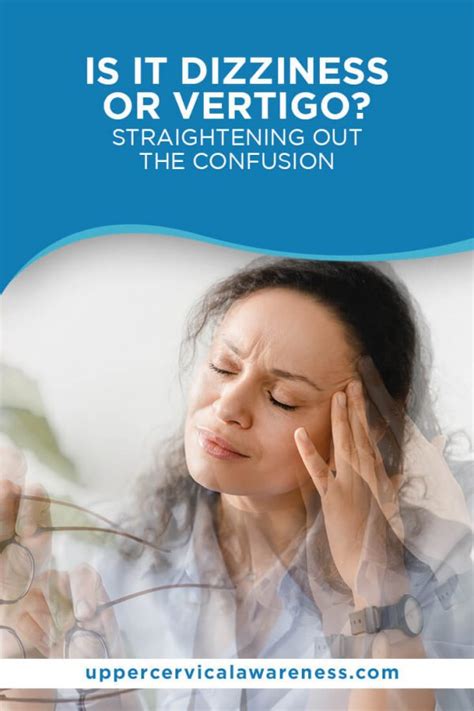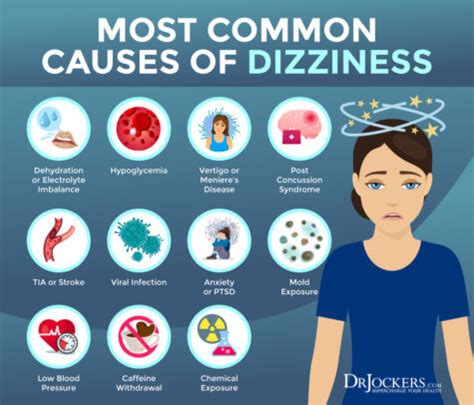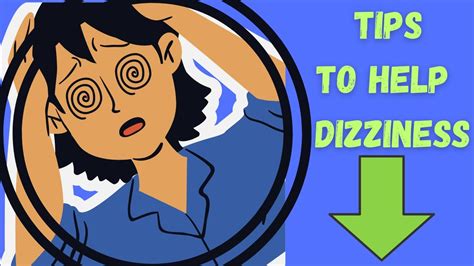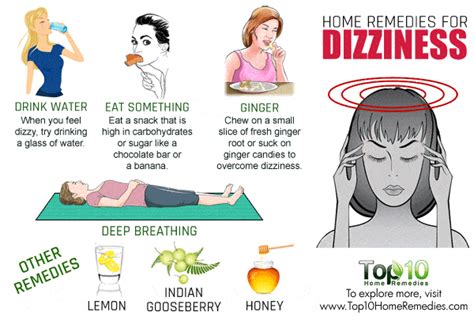Intro
Discover 5 effective ways to stop dizziness, including balance exercises, vertigo treatments, and nausea relief methods, to alleviate lightheadedness and spinning sensations, and improve overall equilibrium and stability.
Dizziness is a common symptom that can be caused by a variety of factors, including inner ear problems, medication side effects, and underlying medical conditions. It can range from a mild, occasional annoyance to a severe, debilitating condition that interferes with daily life. If you're experiencing dizziness, it's essential to understand the possible causes and explore ways to manage and prevent it. In this article, we'll delve into the world of dizziness, discussing its types, causes, and most importantly, effective strategies to stop it.
The impact of dizziness on daily life cannot be overstated. Simple tasks like walking, driving, or even standing up from a sitting position can become daunting challenges. The fear of falling or losing balance can lead to anxiety, further exacerbating the condition. Moreover, dizziness can be a symptom of an underlying condition that requires medical attention. Therefore, it's crucial to address dizziness promptly and effectively.
Understanding the causes of dizziness is the first step towards managing it. Dizziness can be caused by problems in the inner ear, such as benign paroxysmal positional vertigo (BPPV), vestibular neuritis, or labyrinthitis. It can also be a side effect of certain medications, including antidepressants, antihistamines, and blood pressure medications. Additionally, underlying medical conditions like hypothyroidism, anemia, or heart conditions can cause dizziness. Identifying the underlying cause is vital to develop an effective treatment plan.
Understanding Dizziness

Causes of Dizziness

Inner Ear Problems
Inner ear problems are a common cause of dizziness. The inner ear contains the vestibular system, which is responsible for balance and equilibrium. Conditions like BPPV, vestibular neuritis, or labyrinthitis can disrupt the vestibular system, leading to dizziness and vertigo. BPPV is a condition where small crystals in the inner ear become dislodged, causing vertigo and dizziness. Vestibular neuritis is an inflammation of the vestibular nerve, while labyrinthitis is an infection of the inner ear.Effective Strategies to Stop Dizziness

- Vestibular Rehabilitation Therapy (VRT): VRT is a type of physical therapy that helps improve balance and reduce dizziness. It involves a series of exercises and maneuvers that can help the brain compensate for inner ear problems.
- Canalith Repositioning Procedure (CRP): CRP is a non-invasive procedure that involves a series of maneuvers to help relocate the small crystals in the inner ear. It is often used to treat BPPV.
- Medication: In some cases, medication may be prescribed to alleviate dizziness. Antihistamines, anticholinergics, and benzodiazepines are commonly used to treat dizziness.
- Lifestyle Changes: Making lifestyle changes, such as getting regular exercise, eating a balanced diet, and managing stress, can also help alleviate dizziness.
- Home Remedies: There are several home remedies that can help alleviate dizziness, including ginger, vitamin B12, and magnesium.
Vestibular Rehabilitation Therapy (VRT)
VRT is a highly effective treatment for dizziness caused by inner ear problems. It involves a series of exercises and maneuvers that can help the brain compensate for inner ear problems. VRT can be customized to meet the individual needs of each patient and can be performed in a clinical setting or at home.Home Remedies for Dizziness

- Ginger: Ginger has natural anti-inflammatory properties that can help alleviate dizziness.
- Vitamin B12: Vitamin B12 plays a crucial role in maintaining balance and equilibrium. Deficiencies in vitamin B12 can contribute to dizziness.
- Magnesium: Magnesium is an essential mineral that can help alleviate dizziness. It can be found in foods like dark leafy greens, nuts, and seeds.
Lifestyle Changes to Prevent Dizziness
Making lifestyle changes can also help prevent dizziness. These include:- Getting Regular Exercise: Regular exercise can help improve balance and reduce dizziness.
- Eating a Balanced Diet: Eating a balanced diet that includes plenty of fruits, vegetables, and whole grains can help alleviate dizziness.
- Managing Stress: Stress can exacerbate dizziness. Engaging in stress-reducing activities like meditation, yoga, or deep breathing can help manage stress.
Conclusion and Next Steps

We hope this article has provided you with valuable insights and information on how to manage and prevent dizziness. If you have any questions or comments, please don't hesitate to share them with us. Your feedback is invaluable in helping us create content that is relevant and useful to our readers.
What are the most common causes of dizziness?
+The most common causes of dizziness include inner ear problems, medication side effects, and underlying medical conditions. Inner ear problems, such as BPPV, vestibular neuritis, or labyrinthitis, can cause dizziness due to disruptions in the balance system.
How can I prevent dizziness?
+Making lifestyle changes, such as getting regular exercise, eating a balanced diet, and managing stress, can help prevent dizziness. Additionally, incorporating home remedies like ginger, vitamin B12, and magnesium into your daily routine can also help alleviate dizziness.
What is Vestibular Rehabilitation Therapy (VRT)?
+Vestibular Rehabilitation Therapy (VRT) is a type of physical therapy that helps improve balance and reduce dizziness. It involves a series of exercises and maneuvers that can help the brain compensate for inner ear problems.
Can home remedies help alleviate dizziness?
+Yes, home remedies like ginger, vitamin B12, and magnesium can help alleviate dizziness. These remedies have natural anti-inflammatory properties and can help improve balance and equilibrium.
How long does it take to recover from dizziness?
+The recovery time from dizziness depends on the underlying cause and severity of the condition. In some cases, dizziness can resolve on its own within a few days or weeks. However, in other cases, it may require medical attention and treatment to alleviate symptoms.
